![]() In 1975 the UK held a referendum on whether we should remain a part of the European Community. Daniel Payne explores some of the campaigning literature and other material the Library holds from that referendum.
In 1975 the UK held a referendum on whether we should remain a part of the European Community. Daniel Payne explores some of the campaigning literature and other material the Library holds from that referendum.
Thankfully or otherwise, the internet did not yet exist in 1975, so the body of information capturing the debate around the UK’s membership is not quite as complicated as it is in 2016. Nonetheless, there was a wealth of printed material used during the run-up to the 1975 campaign. The official campaigning organisations consisted of “Britain in Europe” (campaigning for a Yes) and the “National Referendum Campaign” (campaigning for a No), who both produced leaflets as a result of a government grant which were then distributed to households in the UK.
Leaflets from 1975 Referendum. From LSE Library COLL MISC/0876/1 and COLL MISC/0876/2
As in 2016, a number of other organisations sprouted. Here’s a membership form from the “Don’t Know campaign”, which encouraged voters to tick both Yes and No; claiming that “it is grossly unfair that I should be asked to make this decision” and requesting the government to “do its own job”.
Membership form from “Don’t Know Campaign” in LSE Library LONGDEN/9/25
Documenting the debate beyond the campaigning literature of 1975, the library also holds various pieces from a number of other organisations such as the European Movement, the Federal Union, the Bruge Group, and the Campaign for Independent Britain. Key early collections include the archives of the European Community for Coal and Steel (ECSC), as well as various pamphlets charting early ideas of European federalism.
LSE Library, SHORE/10/455
For an insight into the thoughts of key political figures at that time, we also hold notes from interviews conducted by journalist Hector Alistair Hetherington covering the period 1958– 1975 (LSE Library, HETHERINGTON/22). These interviews take the form of discussions around current political issues of that time, which naturally include the referendum. At a (boozy) lunch in January 1975, Hetherington interviews then Prime Minister Harold Wilson:
“In general Harold was in a very good mood and didn’t make too many nasty cracks. He must have drunk about 3 or 3.5 pints of beer as well as eating a very hearty lunch and smoking a cigar”. A handwritten addendum in brackets follows: “(Also 2 campari and 2 brandies)”.
A few months down the line, in May of that year, the mood has changed. “He regretted the length of the campaign. It was his own fault. Roy had wanted to start the Bill on its way through the House before the negotiations had been completed. Harold and him had been against it then”.
From a lunch in December 1974, Hetherington interviews Peter Shore (a Labour politician who was opposed to the UK’s entry into the EEC):
He [Shore] expects to win. He seemed genuinely quite confident about that (Unless he was putting on a remarkably good act). He thought that we would come out and stay out. For him, the most important question lies…. in the political psychology of membership. He just did not believe that the British people saw the EEC as a community in which they could find political life.
Another interview with Alic Buchanan-Smith (Shadow Secretary of State for Scotland) gives a Scottish perspective on the referendum: “He felt that the SNP had miscalculated in coming out so strongly against the Common Market”. Alic explains various projects in Scotland which were “largely financed by the ECSC… and ECC aid”, such as the Ravenscraig Steel Works and the “big Peterhead power station”.
Images from various campaigning organisations during 1975 referendum. Available at LSE library in following collections (clockwise top left): COLL MISC 0876/1, COLL MIC 0876/2, CIB/10/8, LONGDEN/9/25, LONGDEN/9/25, COLL MISC 0876/1, COLL MISC 0876/1
This is just a snapshot of the available archive material on Britain’s long and unique relationship with Europe, which includes negotiations on Britain’s membership of the EEC, the papers of Alan Sked (founder of the Anti-Federalist league and Emeritus Professor at the LSE) and Frances Josephy (a liberal politician and chair of the Federal Union).
For further information on accessing and using this unique collection of material surrounding Britain and its relationship to the EU, get in touch with Daniel: d.payne1@lse.ac.uk.
This post represents the views of the author and not those of BrexitVote, nor the LSE.
Daniel Payne is curator for the politics and international relations collections at the LSE Library.


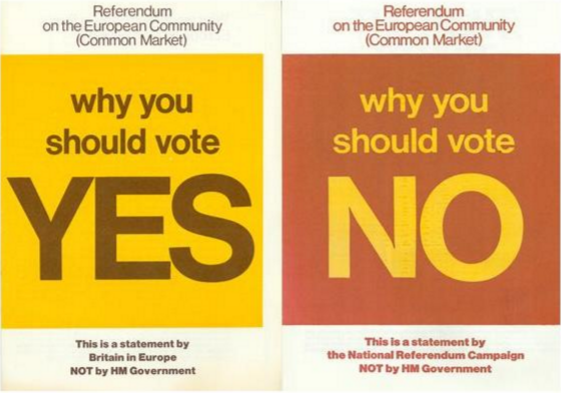
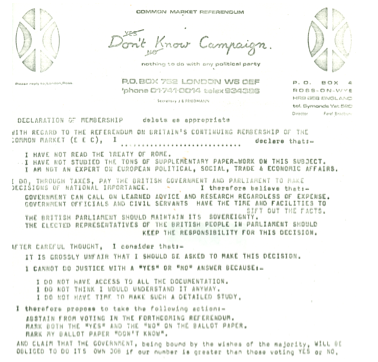
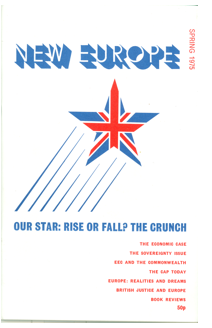
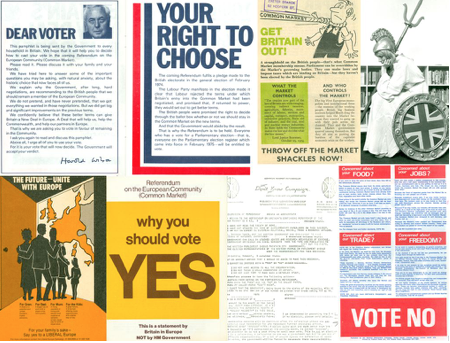




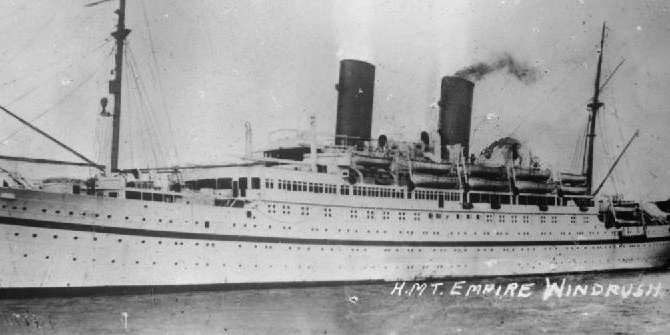
2 Comments